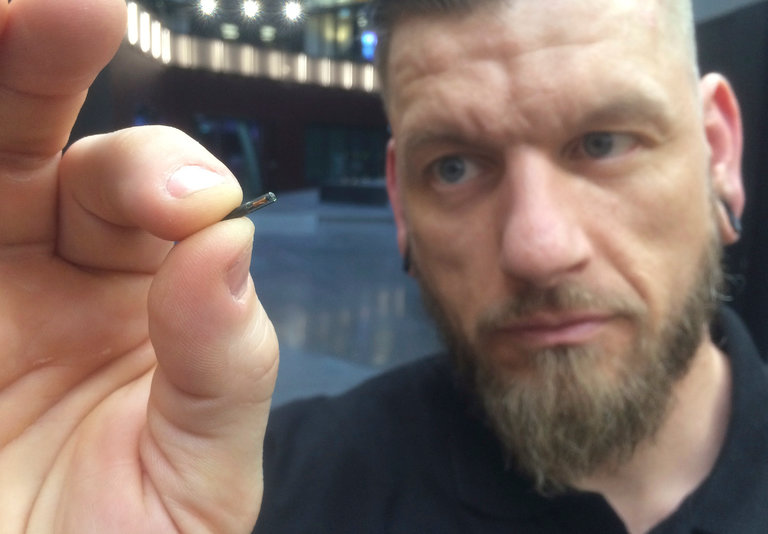A company from Wisconsin is going to implant microchips in its employees so that they can open doors without smart cards

Such a chip is planned to be inserted under the skin on the arm by employees of an American company.
People who, for one reason or another, implant chips into their bodies, are not so few. Someone does this in order to facilitate the task of paying for daily purchases (put a hand to the terminal, and is ready). Someone does the same to get fame. As far as can be judged, a company from Wisconsin, which announced its intention to install chips for its employees, plans to optimize various working processes and get some fame.
The company is called Three Square Market, it is one of the first organizations in the USA that is going to implant chips into its employees. “We believe that we are doing the right thing by introducing technological innovations into our business,” said the head of Three Square Market. According to him, no one is going to force employees to agree to install chips in the body, this is a purely voluntary matter.
Well, there are already volunteers - there are more than 50 of them, so soon all these people will receive chips in their hand. The chip itself is a miniature device worth $ 300. Such a system is implanted in the arm with a needle. Place of implantation - the space between the thumb and index finger, at the base. Those who have already tried the operation on themselves say that it hurts, although the sensations cannot be called terrible.
Earlier in the Three Square Market acted card registration system of the arrival of employees to work. Also, some doors in the company open only if the employee has the appropriate access. Well, the access level is registered in the chip on the card. The problem is that these cards people often forget at home, which interferes with the work process. Therefore, there was a proposal to introduce the chip directly into the hand.
It is clear that many immediately had thoughts about the "Big Brother". That is, people are afraid of spying on the part of the company. But the head of all reassured, saying that there is no surveillance, and indeed can not be, because the chips are not equipped with the appropriate functions.
 Once the miniature appliance is installed in the palm, the employee gets the opportunity to buy food in the canteen, open automatic doors and quickly pass identification on his PC. Tracking function (GPS module) is not provided. At the same time, all the data that the user of such a chip deals with are encrypted. In addition, if desired, a person can pull out the chip, for this you need to undergo another, quick and almost painless procedure.
Once the miniature appliance is installed in the palm, the employee gets the opportunity to buy food in the canteen, open automatic doors and quickly pass identification on his PC. Tracking function (GPS module) is not provided. At the same time, all the data that the user of such a chip deals with are encrypted. In addition, if desired, a person can pull out the chip, for this you need to undergo another, quick and almost painless procedure.
The chip makers are reassured that no intruder can retrieve data from a miniature device. It itself is only an alternative to a payment card and plastic passes with magnetic tape or another type of carrier. Anyway, but information security experts warn that a user with such a chip is actually a carrier of corporate information. If this information is of some value to someone, the chip can be removed by force, or the employee himself will transfer it to competitors for money.
The authors of the project declare that no matter what, they are confident in the correctness of the chosen path. “We are boosting the use of RFID technology to enable users to open doors, use copiers, go through identification procedures on office machines, use telephones, pay for goods, and perform other similar actions,” said Three Square Market. In his opinion, RFID needs to be standardized for a long time and widely used so that people spend less time on various household and corporate tasks.
The company referred to in the article is not the only one who offers its employees to go through the “chipping” procedure. There are other organizations that have already implanted chips in their employees. This, for example, BioHax International, a company that implanted corporate chips to most employees, on a voluntary basis.
Various devices and ordinary people implant themselves under the skin. For example, back in 2013, Tim Cannon launched a rather large device under his skin that collected the owner’s biometric data. The chip is called Circadia 1.0, it can connect to any Android device for data transfer.
There are among us those who implant cameras, specialized sensors and even fitness bracelets. A couple of years ago quite extensive article was published on such people on Geektimes.
It is interesting, and if in the company where you work offered a chip implanted, would you agree?
All Articles